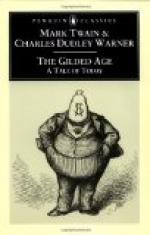“You don’t say so? I thought he was some guy from Pennsylvania. But he is different from others. Probably he has lived all his life on his plantation.”
It was a day reception of Mrs. Representative Schoonmaker, a sweet woman, of simple and sincere manners. Her house was one of the most popular in Washington. There was less ostentation there than in some others, and people liked to go where the atmosphere reminded them of the peace and purity of home. Mrs. Schoonmaker was as natural and unaffected in Washington society as she was in her own New York house, and kept up the spirit of home-life there, with her husband and children. And that was the reason, probably, why people of refinement liked to go there.
Washington is a microcosm, and one can suit himself with any sort of society within a radius of a mile. To a large portion of the people who frequent Washington or dwell where, the ultra fashion, the shoddy, the jobbery are as utterly distasteful as they would he in a refined New England City. Schoonmaker was not exactly a leader in the House, but he was greatly respected for his fine talents and his honesty. No one would have thought of offering to carry National Improvement Directors Relief stock for him.
These day receptions were attended by more women than men, and those interested in the problem might have studied the costumes of the ladies present, in view of this fact, to discover whether women dress more for the eyes of women or for effect upon men. It is a very important problem, and has been a good deal discussed, and its solution would form one fixed, philosophical basis, upon which to estimate woman’s character. We are inclined to take a medium ground, and aver that woman dresses to please herself, and in obedience to a law of her own nature.
“They are coming this way,” said Blanche. People who made way for them to pass, turned to look at them. Washington began to feel that the eyes of the public were on him also, and his eyes rolled about, now towards the ceiling, now towards the floor, in an effort to look unconscious.
“Good morning, Miss Hawkins. Delighted. Mr. Hawkins. My friend, Miss Medlar.”
Mr. Hawkins, who was endeavoring to square himself for a bow, put his foot through the train of Mrs. Senator Poplin, who looked round with a scowl, which turned into a smile as she saw who it was. In extricating himself, Mr. Hawkins, who had the care of his hat as well as the introduction on his mind, shambled against Miss Blanche, who said pardon, with the prettiest accent, as if the awkwardness were her own. And Mr. Hawkins righted himself.
“Don’t you find it very warm to-day, Mr. Hawkins?” said Blanche, by way of a remark.
“It’s awful hot,” said Washington.
“It’s warm for the season,” continued Blanche pleasantly. “But I suppose you are accustomed to it,” she added, with a general idea that the thermometer always stands at 90 deg. in all parts of the late slave states. “Washington weather generally cannot be very congenial to you?”




